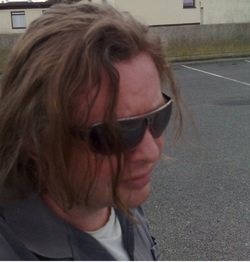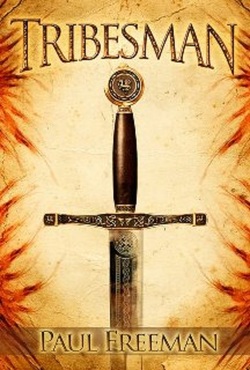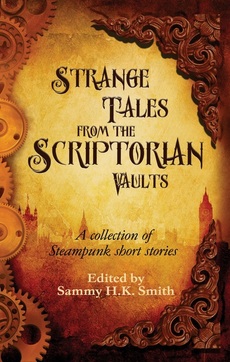
My interview this week is with fellow Cogwheel Press author Paul Freeman, whose epic fantasy Tribesman was released in November 2012. If you like sword-and-sandals-type stuff, run, don't walk, to pick up either the Kindle or the paperback edition. I finished it in 24 hrs, partly because it's a super-tight piece of work at 80,000 words (more on that later), and partly because it's so engaging (and horrifying). Paul is a fun and funny fellow who has other literary irons in many fires, ranging from urban fantasy to steampunk to horror to literary fiction. He's a contributor to the steampunk compilation Strange Tales From the Scriptorian Vaults, and has a horror collaboration coming out in spring 2013. On some level, I know I ought to feel challenged by his prowess, but mostly I find it inspiring.
Paul's a friendly sort; you can get to know him better by reading his blog, following him on Facebook, Goodreads, Amazon, & Twitter, and of course by buying his books. Read on to learn more!
Paul Freeman is from Dublin, Ireland, where he works, plays and writes. In the past he has lived in Germany and America but is now content to keep his roaming to the worlds he creates and writes about.
Tribesman is his first published novel. He has also published a short story in the steampunk anthology, Strange Tales From the Scriptorium Vaults. A horror book, Season of the Dead, written with three other writers will be published by Spore Press in spring 2013.
He is currently working on book 2 in the Tribesman series.

Actually I write in a number of different genres. I have a horror book about the zombie apocalypse, written with three other authors coming out in the Spring, it’s called Season of the Dead, and will be published by Spore Press. I recently tried my hand at steampunk, you can find my short story in the anthology Strange Tales From The Scriptorium Vaults. But yes, Ireland has a very strong tradition in storytelling, and some really wonderful myths which are more often than not quite dark. I grew up on these stories, and epic fantasy I believe is a natural progression from mythology. What are myths but fantastical tales after all.
Do you have a “day job,” or is writing your full-time career?
Yes I do have a day job, one I try to escape from as much as possible and immerse myself in some other fantastical worlds. Fingers crossed writing will eventually become the day job.
What impressed me the most about Tribesman was the worldbuilding – you manage to create a very believable time and place (albeit a broken and violent setting) in very few words. Did you have real geography and mythology in mind, or did it all spring from your fertile imagination?
I think there is a strong flavour of Celtic mythology throughout the book, certainly the war god, Morrigu is based loosely on a figure from mythology, and although the geography is all made up, I think it’s important when worldbuilding to stick to certain natural laws, such as, the closer to the poles you get, the colder it gets, different nations and nationalities should have their own quirks and personalities. So to answer the question, a bit of both I suppose.

I see him as real, he fights for what he loves, and will use whatever force he deems necessary. He is tragic in a way as he has obviously been influenced by a dark god who will always use him for her own selfish ends. And yes also heroic to stand up to her and try to escape her influence. As Culainn says himself, it is not real bravery if you are not afraid of the thing in the first place.
What’s on your to-read list? What on your bookshelf inspires you to write?
Well, Discovering Ren of course. All three of the Season of the Dead writers have released books recently, I’d highly recommend them all. Lykaia from Sharon Van Orman, Vein Fire from Lucia Adams, and Dropcloth Angels from Gerald Johnston. I’ve also just read Prince of Thorns by Mark Lawrence. I think what inspires me more than other books is the escapism, that and guilt. The guilt of not having written something.
Do you think Tribesman and its sequels would have found a publishing home outside of a small press? Does the author-hands-on approach of small presses bring a noticeable sense of authenticity and/or immediacy to the reader’s experience of a book, or is it invisible?
Yes I believe so, I don’t want people to hold back and say Tribesman is a very good for a book for a small publishing house, I want them to compare it with their favourites. I think it would have found a home with a bigger publisher, but patience is not something I have in abundance, I’d rather take the offer on the table and run with it. With a small press the author has to be very active in promoting their own book, but it’s going that way with major publishers too. More and more authors are making themselves very approachable to their readers, whether through blogs or online social networking.
My first book was an urban fantasy of 140,000 words, some day I might even dig it out. For the Tribesman books though, I think the 80,000 mark is about right with the story so focused on one main character. But who knows, maybe in the future I’ll tackle something on a grander scale.
Give us a hint of where the Tribesman story is going – is there going to be a happy ending at some point? Right now, it’s unrelievedly bleak, and yet we’re rooting for Cullain to find some kind of peace and resolution.
Well, I can tell you that book 2 brings Culainn home. He is among the Northern Clans, with a whole new set of foes and fiends. And yes the body count is high :) .

 RSS Feed
RSS Feed